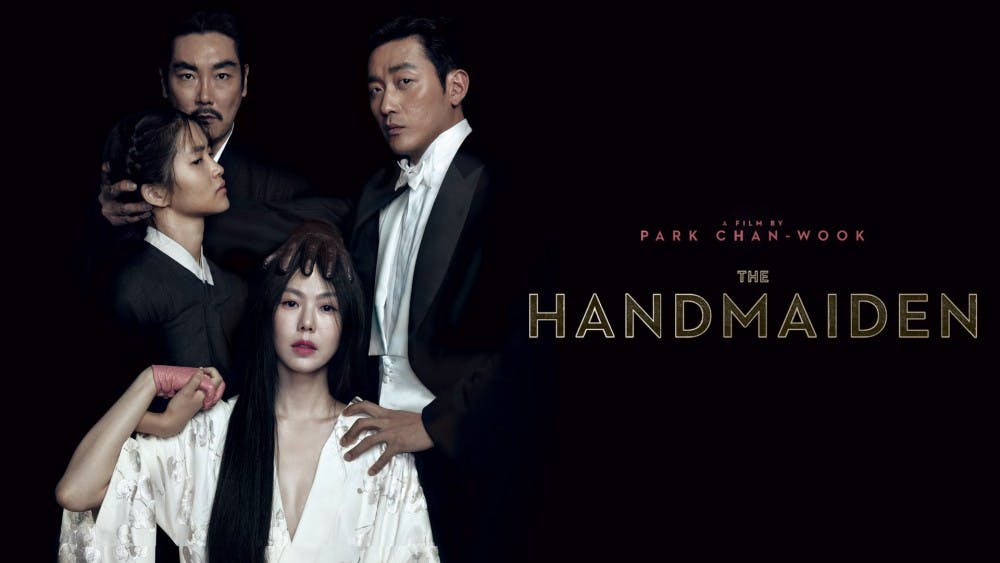In this week’s edition of “Movie reviews by Richard Morris that no one really reads or cares about,” I’ve decided to take a brief hiatus from the endless biopics, PG-13 horror flicks and obvious Oscar bait and have elected to go in a new, bold direction. So hold onto your hats, folks, cause this review’s gonna be a real doozy. And no, it’s not Fifty Shades Darker — I’d sooner impale myself on the end of a well-crafted, sturdy wooden spear than fund the literately-challenged exploits of E.L. James, a certified dunderhead whose fame and fortune took less effort than even the most complacent of the Kardashian sisters.
The Handmaiden, a Korean and Japanese language movie directed by Chan-wook Park (who previously directed the award-winning international hit, Oldboy) and based loosely on the British novel Fingersmith by Sarah Waters, is an intense, deeply visceral exercise in filmmaking. It balances overtly sexual subject matter and an often crude sense of humor with symbolically powerful imagery and an intelligently-told story to put forth a piece of cinematic ingenuity that is equal parts entertaining and thought provoking. Combining aspects and inspiration from several different genres, Chan-wook’s vision is something entirely of its own kind, not merely a drama or mystery or thriller, but all three simultaneously.
On its most basic level, The Handmaiden follows a young Korean pickpocket by the name of Sook-Hee who is recruited by a swindler to become a maid to Lady Hideko, the lonely heiress of a large family fortune that is soon to be forced into marriage with her Uncle Kouzuki. In an attempt to steal her inheritance and split the money between themselves, Sook-Hee must convince Lady Hideko to marry the scammer under the guise of the powerful Japanese Count Fujiwara, but the plan is thrown into disarray in light of a budding and passionate romance between the Lady and her handmaiden. Over the course of the two-and-a-half hour runtime that spans three separate acts, the plot patiently unveils itself through a series of unexpected twists that, by its conclusion, fit together with such efficiency and fluidity that is rare of such a convoluted story, as Chan-wook and co. manage to account for every stray detail and minor inconsistency to near perfection.
Though The Handmaiden’s plot is both complex and rigorously detailed in nature, it is still a film largely driven by its characters. Rather than writing the characters around the story, Chan-wook and co-screenwriter Seo-kyeong Jeong design the story to fit the personalities of those within it. Every moment of development and chemistry-building between characters has implications on the plot’s overarching progression, and the conflict at the heart of the story feels like a constantly shifting chess match between intelligent and worthy adversaries. Even on a smaller scale, the on-screen interaction from scene to scene is incredibly entertaining to watch, as the tension and chemistry between cast members is palpably felt (though, the more explicit scenes between Sook-Hee and Lady Hideko are admittedly quite awkward when surrounded by strangers in a decently crowded theater).
On a technical level, Chan-wook has proved himself once more to be immensely talented in a visual and cinematic sense. The Handmaiden, not unlike previous works by the Korean filmmaker, is stylistically of a certain high class crudeness that balances vulgar material with a refined presentation that suggests a deeper interest with how the subject matter is put forth rather than what that subject may be. This is especially evident in comparing the way in which sex is portrayed within the film — the scenes between Sook-Hee and Lady Hideko are explicit, but nonetheless presented as a delicate and passionate act of lovemaking, whereas the sexual advances of the men within the film are shown as forceful and altogether unpleasant. On a different note, the set and costume designs play an underrated part in the story’s presentation, as both believably capture both the historical context of the film and the closed-in and oppressive nature of the setting.
Staying true to my longstanding dislike for drawn out conclusions that repeat points that were mentioned previously to provide the review with an unnecessary and contrived sense of closure, I’ll end by saying that The Handmaiden was a really good movie: great, perhaps. Give it a watch, preferably with someone other than your parents or your one morally pure friend that thought Wall-E was a bit too counterculture for his or her taste. And, please, I beg of you, don’t see Fifty Shades Darker. The fate of the movie industry and E.L. James' hopeful impending bankruptcy depends on it.
Five stars (out of five).






